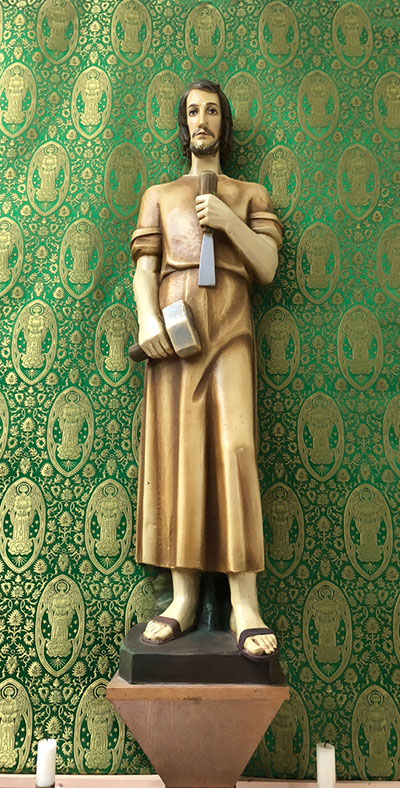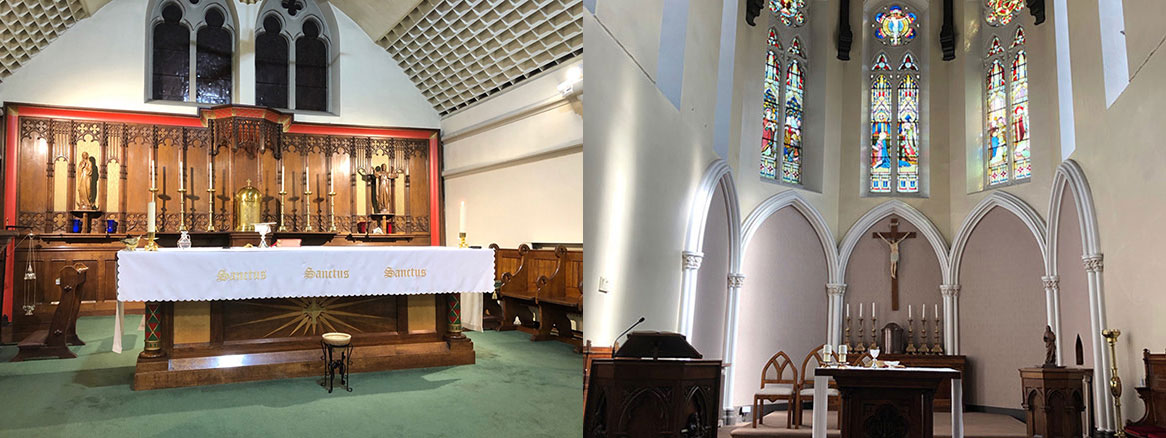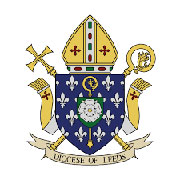Today’s reflection
Wednesday June 17th
Elijah is succeeded by Elisha
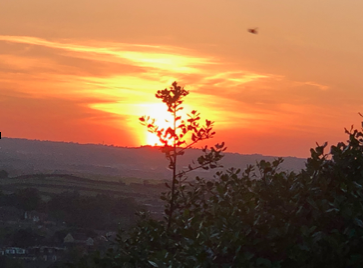
What is the job description of a leader chosen by God, a king or a prophet? Often is seems the Lord selects unwilling or unlikely candidates to be his messenger or earthly ruler.
Moses was found floating in a basket in the rushes of the Nile. Adopted and raised in the Royal Household he has to flee after having slain an Egyptian who brutalised an Israeli slave. Later he is united with Aaron, his bother, and Miriam, his sister. Moses argues with his God as he leads the people from Egypt through the desert towards the land of milk and honey, ‘I have never been eloquent … for I am slow and hesitant of speech.’ So God appoints Aaron to be his voice, his prophet for a while. (Ex 4:10)
From the point of view of the Israelis, God is reluctant to allow them to be ruled by a monarchy. (1 Sam 8) The text lists the negative side to supporting a Royal Family but still the people demand it so that they can be like the other nations around them. God choses Saul, from the least important family of the smallest of the twelve tribes of Israel. Samuel anoints Saul as king with oil by pouring oil on his head. It is why we still use oil in the Sacraments of Baptism, Confirmation, Ordination and for anointing in times of need. Saul proves to be a wise leader. After Saul, God choses David, the youngest son of the family of Jesse, called in from the wilderness where he had been looking after the sheep.
Isaiah is a hesitant prophet (Is Ch.6) and it is thought Jeremiah had a speech impediment. Elijah spent time in hiding and Elisha was busy working the fields when called. Prophets , then and now, serve to temper the worst excesses of the kings, governments and the general population. They hold the God’s people to account and remind us all to focus our lives on the right things: divine praise and love of family, friends and care for the outsider.
The call of the Lord is not a thing of the past. Today God has a variety of spokespeople: young footballers, campaigners for a greener, more just and equal world, even politicians.
If we allow ourselves to listen, the gentle calling of the Lord is there amidst all the competing sounds in our heads. Do we have the courage to listen and respond to the Lord’s call to be a prophet in our time and place?
Tuesday 16th June
Saint Richard of Chichester (1197 – 1253)
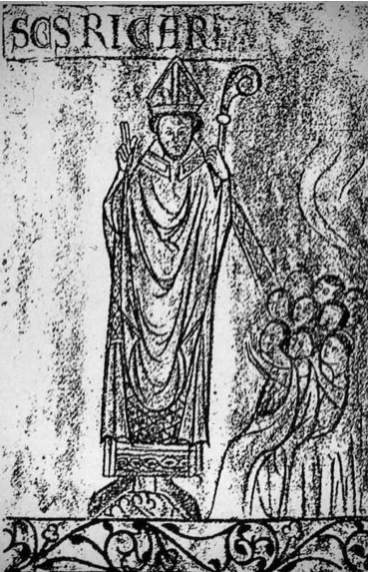
It is good to read the biographies of our saints. Often we find that they were not particularly promising at first but something or someone changed them. Saint Richard is a good example of a man without a promising start but a great finale! It would take you a couple of minutes of your day to go to Universalis. This is available here.
In today’s Gospel we are commanded to ‘be perfect as your heavenly Father is perfect’. This is also translated: ‘Therefore you must set no bounds to your love, just as your heavenly Father sets no bounds to his.’ A tall order. How do we start? We get no where if we fall back on the idea that no one can be perfect in this life. Not even Saint Richard. Whilst true, it is still good to aim high. It can be hard work but not all of the road to goodness is tough going. There are moments of free wheeling too. Times when we might simply let ourselves fall into the arms of the Lord. Elijah found God in the gentle breeze, the apostles must have enjoyed the meals they shared with Jesus. All the movement and banter. The conversations around the table we read in the Gospel may seem pointed at times, but Jesus would not have been welcomed into peoples homes if he was such a difficult man to entertain. No doubt there would have been a great deal of humour and laughter intermingled with the teaching. When a priest prepares the chalice he pours in the wine and then adds a few drops of water. There are various reasons for this but, as an altar server, I recall being told that this reflects the incarnation of Jesus. We are also flesh, blood and water. Jesus became as one of us, to experience the same joy and pain and point the way to a better way to be.
Monday 15th June
The Books of Samuel and Kings tell us much of the history of ‘God’s chosen people’ in the thousand years or so before the birth of Jesus. What makes them unusual is that they are very critical. Most communities who set about recording their history tend to go light on their failures and emphasise their successes.
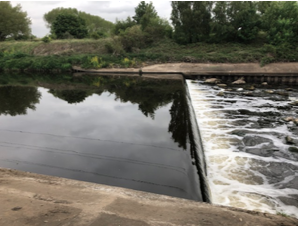
Here we find that they did not flinch from detailing the dirty dealings and corruption of their kings and officials. It is the role of the prophets to keep the whole community in line and stop them from collapsing in to bad practice.
The story of Naboth’s vineyard talks of greed and envy. King Ahab wants the land that Naboth has his vines on but cannot cope with the refusal of this farmer to sell. HIs wife goes behind his back and gets the land by deceit and murder. When Elijah identifies the crime, Ahab at least repents of what occurred and some semblance of order is restored.
It is from this line of Kings that Jesus is born. It is for him to show everyone how to treat others with love, justice and respect and so restore the reputation of the sovereigns who ruled before.
A friend of mine recently sent me a little meditation that you might enjoy:
A sick man turned to his doctor as he was leaving the examination room and said,
‘Doctor, I am afraid to die. Tell me what lies on the other side.’
Very quietly the doctor said, ‘I don’t know…’
The patient was taken aback, ‘You don’t know? You are a Christian man and you don’t know? The doctor was holding the handle of a door. On the other side came the sound of scratching and whining. As he opened the door a dog sprang into the room and leapt on him with a show of affection. Turning to the patient, the doctor said,
‘Did you notice my dog? He’s never been in this room before. He didn’t know what was inside. He knew nothing except that his master was here and when the door opened he sprang in without fear.
I know little about what is on the other side but I know one thing – My Master is there and that is enough for me.’
FEAST OF CORPUS CHRISTI
THE BODY AND BLOOD OF CHRIST
JUNE 14th 2020
The blessing-cup that we bless is
a communion with the blood of Christ,
and the bread that we break is
a communion with the body of Christ.
The fact that there is only one loaf means that,
though there are many of us,
we form a single body because we all have a share in this one loaf.
1 Corinthians 10:16-17
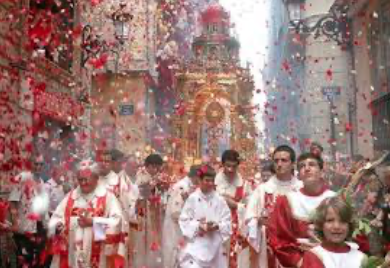
Peter van Breeman, author of As Bread That is Broken, describes God as
The Deepest Ground
of our Being
We focus today on receiving our Saviour in the gifts of Bread and Wine. Our essential resource that we call on for our strength and vitality.
We long for the day, fast approaching, when we can celebrate our faith together all the wiser for the experience of the last few months. We may have lost opportunities to celebrate birthdays, engagements and weddings. Some of us will have lost loved ones and not been able to get to their funeral. We hold them in prayer.
We are missing access to Sacraments. Our parishes should have been celebrating First Holy Communion with our young people today. A delay but not a cancellation. Whilst we may have brought Jesus ever more into our homes recently, soon we will reclaim our spiritual homes: our churches will open up again and we can gather and be in communion with each other. In this way we are there for each other when times are tough and those wonderful moments of joy and laughter.
Saturday 13th June
Saint Anthony of Padua
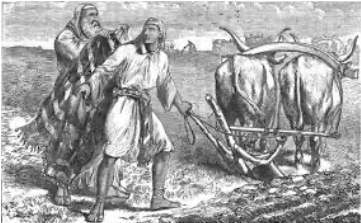
Today we consider two great people who dedicated their lives to be servants of God.
Our Old Testament Reading focuses our attention on Elisha following a calling. He finds what he has to do and leaves everything else to do it. We often hear of people making dramatic decisions to pursue a different goal. this encounter between the prophet Elijah and the farmer Elisha is one such account. Elijah throws his cloak over the shoulders of Elisha as if he was passing on a uniform, a role and all that goes with it. Elisha responds by leaving his land and becoming the new prophet for the people of Israel. He uses his plough to roast the oxen and feed his workers. This illustrates to us the strength of character of the man. There was no going back when his means of farming the land had been consumed.
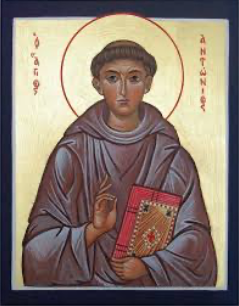 Saint Anthony was a great teacher in Africa. Already a monk in the order founded by Saint Augustine, he met St. Francis of Assisi at a conference. This had a profound affect on him. Many would have been brought to faith by his preaching. They say he was a gentle preacher but a fierce critic of other priests and religious who were not pulling their weight.
Saint Anthony was a great teacher in Africa. Already a monk in the order founded by Saint Augustine, he met St. Francis of Assisi at a conference. This had a profound affect on him. Many would have been brought to faith by his preaching. They say he was a gentle preacher but a fierce critic of other priests and religious who were not pulling their weight.
As we begin to open up our churches again let us pray for missionaries the world over. Our faith and prayers all add up. Together we all make a difference to our world.
Friday 12th June
In today’s Gospel, we continue listening to Jesus as he teaches the crowd gathered by the shores of Lake Galilee. He has set out in the Beatitudes the core of his teaching, what I think of as his manifesto. Jesus presents a way to live which is not easy but can lead us to peace. His words today embellish the theme and they are hard. However, Jesus preaches strongly but is gentle with those who are seeking to live their lives in the light of them. Jesus sets out an ideal way to be – how to be perfect. None of us will measure up in this life, but it is good to aim high.
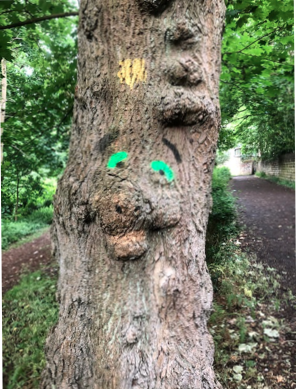
Throughout history, God has been in communication with the whole of Creation. In the Book of Kings the authors use the big events which occur in nature to lead us through the emotional state of our young prophet as he conquers his fear.
As the elements illustrate the drama, we ourselves can reflect on how we cope with uncertainty and learn to harness our abilities with what plans the Lord has for us: our Mission to the world.
In the first reading Elijah peers out of the cave that he has used for shelter.
A storm is raging outside.
It mimics his feelings of turmoil.
He is afraid and unsure of the next step to take.
He finds that he is on shaky ground. Who does he trust? Can he rely on his own resources? The mountains tremble and he realises the state of unrest reaches beyond him. It is not just he who is hurting. Society is at a crunch point.
Now a fire sweeps though the valley as so often occurs after an earthquake. The flames and the heat are destructive but also cleansing. They clear away all the deadwood and provide space and minerals to allow for new growth, fresh shoots from the ashes.
And then there comes the fresh breeze. The world is ready for a new start, after the rage of the storm, the upheaval of the earthquake and the clearance of the old growth and brush by the fire racing through. Elijah is ready to accept a new commission. He has work to do.
God is with Elijah in the fresh air, sunshine and the breeze of the new day. He is given a pile of things to do. None would be achievable without God’s strength. It is the partnership between the prophet and the God of all things which will make the difference.
We may have experienced a turmoil of emotions over the last few weeks. All are important. As we think about standing at the entrance of our houses to look outwards again, we have the chance to make a positive difference to where we live.
Thursday 10th June
SAINT BARNABUS, APOSTLE
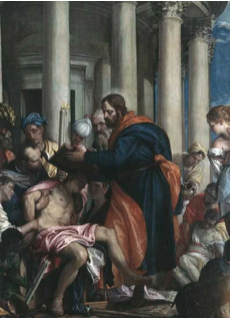 We are told that Saint Barnabus was an early convert to our faith. A cousin of Mark, the Gospel writer, he was born in Cyprus and accompanied Saint Paul on his first long voyage. He would have been filled with a first hand account of the missionary years of Jesus as he toured the Holy Land urging anyone who would listen to change the focus of their lives and accept the Good News and Eternal Life. To know that people in other places remember you in their daily time of quiet and reflection and at Mass makes all the difference. Missionaries go out and live in places that they would never have thought of ever visiting. Faithful to the call of the Lord, what soon becomes clear is that friends they never realised they were going to have are waiting for them where the Spirit guides them.
We are told that Saint Barnabus was an early convert to our faith. A cousin of Mark, the Gospel writer, he was born in Cyprus and accompanied Saint Paul on his first long voyage. He would have been filled with a first hand account of the missionary years of Jesus as he toured the Holy Land urging anyone who would listen to change the focus of their lives and accept the Good News and Eternal Life. To know that people in other places remember you in their daily time of quiet and reflection and at Mass makes all the difference. Missionaries go out and live in places that they would never have thought of ever visiting. Faithful to the call of the Lord, what soon becomes clear is that friends they never realised they were going to have are waiting for them where the Spirit guides them.
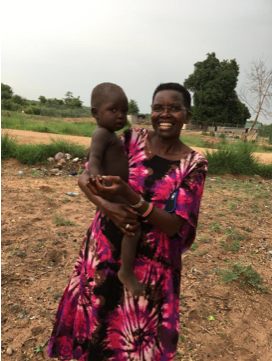 Back at base, people respond and home visits become times to catch up with those who have been in touch, inspired by the growing church community thousands of miles away. Often a new missionary fears loneliness. In my experience the opposite is true. A chant from Kenya goes: God is Good All the Time, and All the Time, God is Good.
Back at base, people respond and home visits become times to catch up with those who have been in touch, inspired by the growing church community thousands of miles away. Often a new missionary fears loneliness. In my experience the opposite is true. A chant from Kenya goes: God is Good All the Time, and All the Time, God is Good.
Some of you have met Sister Scholasticah. Scho is a good friend and is currently working in South Sudan. A Mercy Sister, she teaches nurses in one of the most dangerous parts of the world – and she loves it! We spoke this morning and she sounded so excited to be there. This is despite the real peril of leaving the compound where she teaches and the dreadful toll that Coronavirus is having on the population, especially in the capital, Juba. Let us pray for her and the good people of South Sudan.
Wednesday 10th June
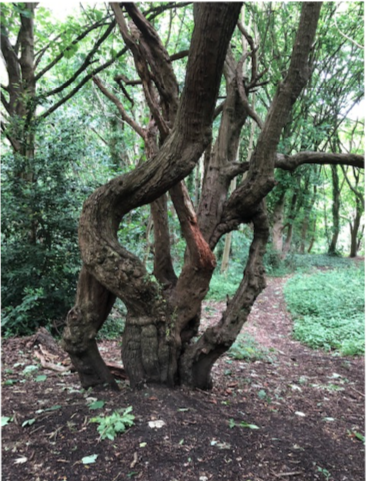
Our first reading takes us right back into ancient history. Just like today there were many religions and styles of worship. Some were not based on love and and bad practices were involved. The prophets were to keep the faithful close to the one true God. Ahab, King of Israel at the time of Elijah, had chosen to join the cult of Baal and so adopt a different style of worship and lifestyle. How the King worships affects his subjects and Elijah stands against his King in an effort to protect God’s chosen from being misled.
The text mocks the hobbling dancing and practices of the priests of Baal, their self- harming and sacrifice. Eventually, Elijah calls on God to show that he and the followers of the God of Abraham, Isaac and Jacob have got it right. No tolerance is shown for the priests and followers of Baal. Thankfully we live in a more enlightened age.
In the Gospel, Jesus defends the Law which can lead us to truth. However his life and preaching demonstrates he had no time for those who were selective of laws which protected only themselves and oppressed others. Properly lived, God’s law sets us all free.
At any age, the relationship we have with our God can deepen and change our lives. A parishioner’s friend has encapsulated her experience in a hymn she has wriNen. It can be sung to the tune of The Church’s One Foundation. Thanks to Gill Hawksworth. My photos from down by the river in East Leeds, Meanwood Valley and Ripon Cathedral.
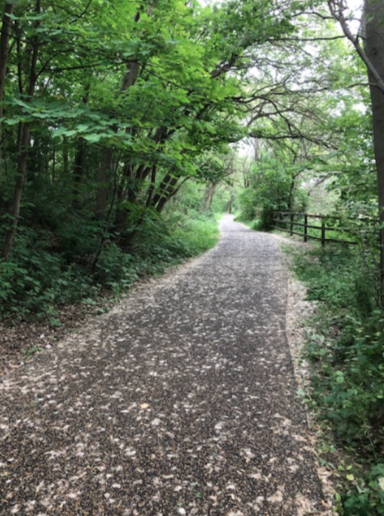
You gave new life to me, Lord
And in your love I grew
With bread and wine you feed me
Upon your strength I drew
With grace I followed freely
My conscience and free will
With spiritual guidance
Your purpose to fulfil.
At times the path was laboured
With sadness and despair
My faith was deeply shaken
I felt so lonely there
I searched my soul for comfort
then turned for hope to you
How could I doubt my trust, Lord,
You always see me through.
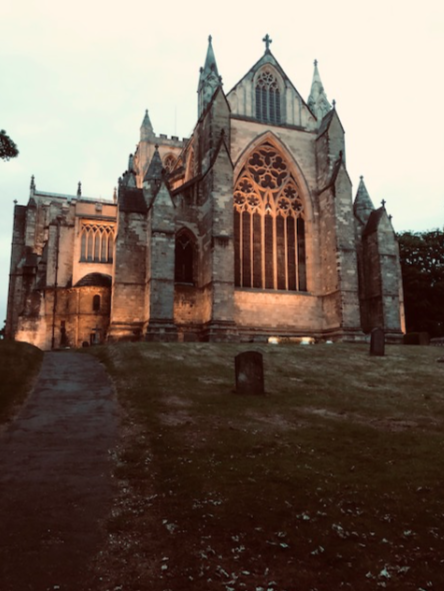 I asked and it was given
I asked and it was given
I took you hand in mine
And walked with you beside me
Along the sands of time
Our footsteps side by side,
Lord And clearly now I see
that in my darkest hours
You held and carried me.
To serve you as my Saviour
Is a privilege divine
Lord, kindle love in my heart
So I may always shine
To radiate your love around
That everyone might see
The friend above all others
Who lives inside of me.
I live and work for you, Lord
And with your help each day
I find the strength to carry on
The true and only way
You gave your life for me, Lord
That I might then be free
I give my life to you, Lord,
What use is it to me.
Tuesday 9th June
WE ARE THE SALT OF THE EARTH
Feast Day of St. Columba of Iona
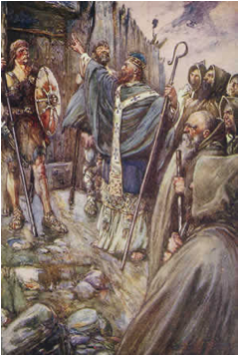
Today’s readings can give us a bit of a fillip, a good reason to feel better about ourselves. We are likened to salt and light, two essentials for life.
We are also reminded how acts of generosity will not go un noticed.
Elijah, hiding in the desert, is hungry. He meets a widow gathering sticks to cook a last meal for herself and her son out of the little oil and flour she has left. The prophet invites himself and she sets out to feed them all. We are told that the provisions are not exhausted and they have enough to live another day. It would have been my mum’s birthday today – she would have been 96! When I was growing up, my mother rarely had any idea how many she would have to feed in the evening as my brothers and sisters would bring home friends and strays from all over. We never went hungry.
Yesterday we looked at the Beatitudes. Perhaps they could be considered like a manifesto, outlining the way Jesus’ ministry would develop over time. They point to good living, even though adhering to the Commandments and Beatitudes is not without cost. Today we are encouraged to be witnesses as salt of the earth and light to the world.
Mohandas Gandhi knew the importance of salt. So did the British. The Salt Act of 1882 prohibited Indians from selling or even collecting salt. In 1930, Gandhi saw it as a means of challenging colonial rule and organised a peaceful protest. He wrote to the viceroy informing him that people would no longer pay the tax which especially damaged the poor. He and an increasing number of followers walked from his spiritual retreat to the coastline of the Arabian Sea near Dandi, now Mumbai, some 240 miles away. There he picked up some salt from the salt flats and so defied the law. It led to his arrest and of some 60,000 Indians but contributed to India gaining independence in August 1947.
The first step to living in a better, more just society always starts with ourselves and how we think and act. The Gospel that feeds us every day challenges us to be shining lights for others to see by, illuminate injustice and lead all people to a fuller experience of life. We can be encouraged by Jesus that we all have what it takes to make a difference.
Monday 8th June
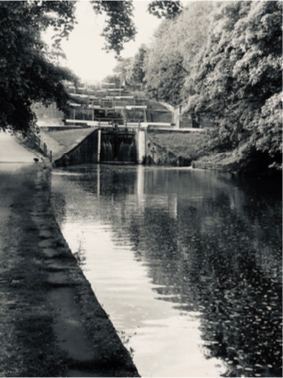
1 Kings 17: 1-6 For the people of Israel, moving from the land and forming towns and cities and having a king to rule them was not without its problems. Whilst they were anointed by God and some are noted for their wisdom, many became greedy and corrupted. Prophets were sent to them as a challenge to the way they ruled and oppressed their people. Generally the prophets did not fair well though their efforts are often better remembered than the authorities they stood up against. Elijah was one of the greatest of the prophets, famous throughout the subsequent history of Israel. However, here we find him on the run, parched and hungry. The authorities had found his message a bit too challenging. Paulo Cuelho is a Brazilian author made famous by books like The Alchemist,. His book The Fifth Mountain, available on free download, illuminates the adventures of Elijah and helps us understand more of his background. During the time Elijah spends in the wilderness, he learns to trust ever more deeply on God. Today’s Psalm 120 (121) covers the same ground:
I lift up my eyes to the mountains, from where shall come my help?
My help shall come from the Lord, who made heaven and earth.
It is the same God who makes all we know who can help us should we ask. (There are often two numbers for the psalms as different Bibles number them differently according to the Christian tradition of the publisher).
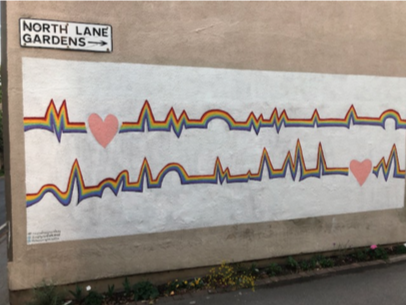
Matthew 5: 1-12 No doubt we are
very familiar with The Beatitudes.
These are an account of the blessings
received by those who love God and try to do the right thing. To live a good life, being kind and respectful to others and leave a small footprint on the earth is not easy. Others who may not be so bothered stunt our progress. It is useful to note that this is how Jesus starts his preaching, gathering a large crowd by the lake which he feeds spiritually, emotionally and physically. He tells us and that crowd that God knows how hard it is to lead a good life. We learn from Elijah that, despite the hardships, God is with us through it all.
Sunday 7th June
THE MOST HOLY TRINITY
A friend working in South Sudan sent us a poem written by Mike, one of her colleagues:
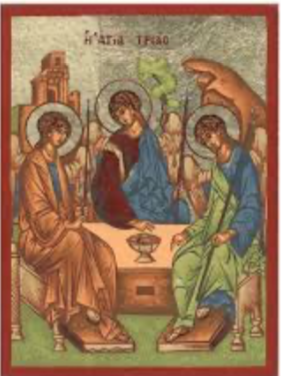
Trinity
Communion of love
beyond infinity of space
gratuitously revealed by faith
as Mysterious Sacred Trinity
Mother/Father of creation
Son of healing compassion
Spirit of profound wisdom
Enduring font of
life giving water
quenching our thirst for equality and peace
Originating source 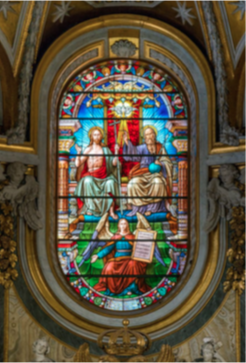
Author of life
breathe again in hearts
making them whole
Unite our humanity
and all on this earth
to be one
as You are one
through bond of kinship with you
that can never be broken.
We believe in a complex God. Three persons wrapped up in the mystery of a Divine Being. Our readings point to that, coming from the most ancient of times when Moses received the Ten Commandments, to Saint Paul blessing the people of Corinth with reference to the Father, Son and Holy Spirit.
At the heart of the revelation of the mystery of God to us is that we might enjoy the life eternal with this God who totally loves all our complex being.
Saturday 6th June
Today we celebrate the feast days of various people who gave what they had to give.
Saint Norbert (1080-1134) founder of the Norbertines, Premonstratensian Order
Saint Marcellin Champagnat (1789-1840), founder of the Marist Brothers.
Saint Jarlath (Sixth Century) founder of a monastery at Tuam, Ireland.
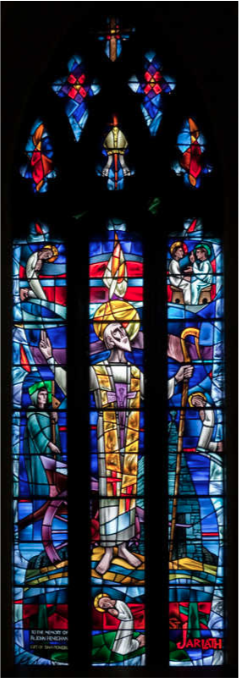 Our Gospel is that of the Widow’s Might. It holds such an important message for us, and it is not just about money. Little seems to be known about Jarlath, but if you were to read the profiles of the other two saints listed above, you might think that neither had much to offer.
Our Gospel is that of the Widow’s Might. It holds such an important message for us, and it is not just about money. Little seems to be known about Jarlath, but if you were to read the profiles of the other two saints listed above, you might think that neither had much to offer.
Norbert was from a wealthy background and had to renounce his riches to be true to his vocation. Marcellin was reckoned by his peers to be not bright enough for the challenges of priesthood. Yet both gave of what they had and ended up founding groups of religious who have done great work for the Lord.
Our faith urges us to be generous with our resources and talents. This is a recurring theme in the preaching of Jesus. It could be the boy with the loaves and fishes, the servants entrusted with cash whilst the land owner is away, the keepers of the vineyard, the guardians of the Temple, the owner of the Upper Room. All were called on to look beyond and reach out to the poor and needy, be it spiritually or emotionally. They didn’t all get it right.
Saint Paul, getting to the end of his days, tells us that his ‘life is already poured out as a libation’, as an offering to God. He has used his body to travel and his intellect enlightened by prayer to proclaim the Word of God.
Sitting in the Temple, watching people flow through the magnificent building, Jesus is not impressed by the religious leaders swishing through in their robes. It is a little lady, without flashy clothes and ignored by most, who contributed to the Temple funds what little she had. She catches the attention of Jesus. In a quiet, otherwise unrecognised act of generosity, she does what she can. Whilst the actions of the others passing through the Temple in their finery that day are not recorded by history, she and her act of faith has become immortalised. If we get it right, we can see that we all have something to offer.
Friday 5th June
Our readings today talk to us about commitment and deep understanding of our faith. Saint Boniface, an early west country Christian understood his faith body and soul. It took him away from his homeland permanently for his mission was across the North Sea. Fidelity to our vocation can take us to places we least expect physically but also spiritually. We stay true to our faith in our daily prayer. This is a reflection on the Lord’s Prayer you might enjoy. It is an imagined conversation between a young person at prayer and God the Father. I have used in schools and whilst leading retreats.
Acknowledgements to the author, Clyde Lee Herring. Adapted from Bread magazine, Nazarene Publishing House. I have made some minor changes too.
Our Father who art in Heaven….
Yes
Don’t interrupt me. I’m praying.
But you called me!
Called you? I didn’t call you. I’m praying. ‘ Our Father who art in Heaven……’
There, you did it again.
Did what?
Called me. You said ‘Our Father who art in Heaven’. Here I am….
What’s on your mind?
But I didn’t mean anything by it. I was, you know, just saying my prayers for the day. I always say the Lord’s Prayer. It makes me feel good, sort of like geSing a job done.
All right, go on.
‘Hallowed be thy name…’
Hold it! What do you mean by that?
By what?
By ‘Hallowed be they name?’
It means…. It means….Good grief. I don’t know what it means. How should I know? It’s just part of the prayer….. By the way, what does it mean?
It means honoured, holy, wonderful…
Ah! That makes sense. I never thought about what ‘hallowed’ meant before. …. ’Thy kingdom come, they will be done on earth as it is in Heaven.’
Do you really mean that?
Of course, why not?
What are you doing to do about it?
Do? Nothing I suppose. I just think it would be rather good if you got control of everything down here as you have up there.
Have I got control of you?
I go to church! What else do you want?
That isn’t what I asked you. What about your bad temper? it’s becoming an issue.
Then spending your money…..all on yourself; and wasting time on rubbish telly…
Stop picking on me! I’m just as good as some of the rest on the pews.
Excuse me. I thought you were praying for my will to be done. If that is to happen it
will have to start with the ones who are praying for it. Like you, for example.
OK. To be fair, I do have some issues I suppose. I could probably name some others.
So could I.
I haven’t thought about it very much until now, but I really would like to cut out some of those things. I would like to, you know, be really free.
Good! Now we’re getting somewhere. We’ll work together, you and I.
We’ll get somewhere. I’m proud of you.
Look, Lord, I need to crack on. Things to do. ‘Give us this day our daily bread.’
You need to cut out the bread. You’re overweight as it is.
Hold on, what’s this? ‘Criticise Me Day?’ Here I am, doing my religious duty, and all of a sudden you break in and give me grief.
Praying is a dangerous thing. It could change you. It’s what I am trying to tell you. You called me and here I am. It’s too late to stop now. Keep going. I’m interested in the next bit……. well go on.
I’m scared to.
Scared? Of what?
I know what you’ll say.
Try me and see
‘Forgive us our debts as we also have forgiven our debtors.’
What about Will? You used to be pals.
See! I knew it! I knew you would bring him up! Why, Lord? He’s told lies about me, cheated me out of cash. Never paid me back. I’ve sworn to get even with him!
But your prayer? What about your prayer?
I didn’t mean it
At least you’re honest.
But it’s not much fun carrying that load of bitterness around inside, is it?
No, but I’ll feel better as soon as I get even. He’ll wish he never hurt me.
You won’t feel any better. Worse, in fact. Revenge isn’t sweet. Think of how
unhappy you already are. Want us to change that?
You can? How?
Forgive Will. Then I’ll forgive you. Then the hate and sin will be Will’s problems
and not yours. You may lose the money, but you will have settled your heart.
But, Lord, I can’t forgive Will.
Then I can’t forgive you.
Thanks for your help! All right. More than I want revenge on Will, I want to be right with you…… So I forgive him. Help him to find the right road in life. Lord,. He must be seriously miserable now that I think about it. Anybody who goes round doing the things he does to others has to be mixed up inside. Someway, somehow show him the right way.
There now! Wonderful! How do you feel?
Starting to ease up. Not bad. Not bad at all. Fantastic. Relaxed. Maybe I won’t be so tired from now on because I couldn’t sleep.
You’re not through with your prayer. Go on.
Oh, all right. ‘And lead us not into temptation, but deliver us from evil.’
Great I’ll do just that. Just don’t go to a place where you can be tempted.
What do you mean?
You may need to re-think who your friends are. Some people you know might get you involved in things that aren’t healthy. Don’t be fooled. They say they’re sorted, but for you it would be ruin. Don’t use me for an escape hatch.
I don’t understand
Yes you do. You do it loads of times.You get into trouble and then you come running to me. ‘Lord help me out of this mess and I promise you I’ll never do it again.’ You remember some of those deals you try to make with me?
Yes, and I’m ashamed, Lord, I really am.
What are you thinking about?
Well, when our neighbour saw me coming out of the pub. I’d told my mother I was going to the shop. I remember telling you ‘O God, don’t let her tell my mother where I’ve been. I promise I’ll be in church every Sunday.’
She didn’t tell your mother, but you didn’t keep your promise, did you?
I’m sorry Lord, I really am. Up until now I thought that just praying was enough. I didn’t expect you to answer like this.
Go ahead and finish your prayer.
‘For thine is the kingdom, and the power, and the glory, forever, Amen’
Do you know what would bring me glory? What would really make me happy?
No, but want to know now. I want to get it right.
You just answered the question.
I did?
Yes. The thing that would bring me glory is to have people like you truly love and follow me; and I see that happening between us. Now that we are really talking, there is no limit to what might happen.
Lord, let’s see what we can make of me, ok?
Yes, let’s see.
Glory be to the Father,
And to the Son
And to the Holy Spirit
As it was in the Beginning
Is now and Ever Shall be
World without end.
AMEN.
Thursday 4th June
The readings are hard ones to sit with. In this reflections I try and find a way through them. I hope it helps. Both readings today speak of sacrifice. The harrowing account of Abraham and his son, his only son, going up the mountain. The precious yet agonising moments that Jesus had in the Garden of Gethsemane before the events of the that night and subsequent day. Both readings illicit strong emotional responses from us – how could these things be allowed to happen? Why must we suffer?
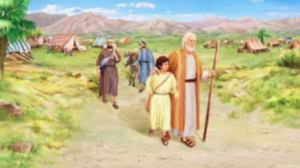 Reading about Abraham we go way back in time and are challenged by its culture and practices. It’s a bit like visiting an ancient ruin. We are told Abraham has a knife or perhaps a blade. Trusting in God but going against all his instincts as a loving parent, he moves to dispatch his son, his only son. I repeat this phrase as it is used to highlight the horror of the situation in the text. Just in time the tension is eased. A goat or ram caught in some thorns becomes the sacrifice instead.
Reading about Abraham we go way back in time and are challenged by its culture and practices. It’s a bit like visiting an ancient ruin. We are told Abraham has a knife or perhaps a blade. Trusting in God but going against all his instincts as a loving parent, he moves to dispatch his son, his only son. I repeat this phrase as it is used to highlight the horror of the situation in the text. Just in time the tension is eased. A goat or ram caught in some thorns becomes the sacrifice instead.
Archeologists have discovered evidence of human sacrifice all over the world which points to what a society will do in extreme circumstances like drought or famine. Scripture scholars tell us that this text confronts the sacrifice of human beings and especially children. It separates out Abraham and his descendants from this crime and moves society forward. Therefore he will have more children who will prosper and be as numerous as the stars that shine or grains of sand on the sea strand. They will flourish whilst other surrounding cultures permit their children to suffer.
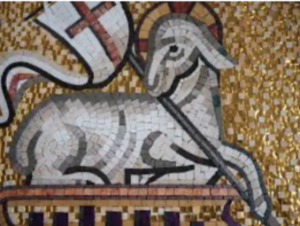 And so we come to consider Jesus in the Garden preparing to sacrifice himself, the lamb trapped in the thorns. The Gospels give us enough detail to draw us into the situation: the cold sweat of our Saviour, the sheer exhaustion of his friends, the baying of the crowds, the chaos of the authorities and the lack of strength of character that allows the situation to become a murder scene. It is the story of Isaac all over again, except Jesus does become the ‘scapegoat’. It is only God who can turn this tragedy into a story of salvation, of hope. That any blood which must be spilled has been spilled already. Enough is enough.
And so we come to consider Jesus in the Garden preparing to sacrifice himself, the lamb trapped in the thorns. The Gospels give us enough detail to draw us into the situation: the cold sweat of our Saviour, the sheer exhaustion of his friends, the baying of the crowds, the chaos of the authorities and the lack of strength of character that allows the situation to become a murder scene. It is the story of Isaac all over again, except Jesus does become the ‘scapegoat’. It is only God who can turn this tragedy into a story of salvation, of hope. That any blood which must be spilled has been spilled already. Enough is enough.
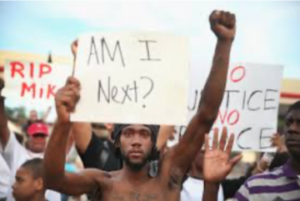 We see examples of prejudice and greed which allows suffering not far removed from what we can read in Genesis.
We see examples of prejudice and greed which allows suffering not far removed from what we can read in Genesis.
However, the situation is not without light. We look to the west and witness people protesting the death of a man in Minneapolis. Others campaign for justice for the oppressed at work or suffer in the home. Meanwhile our talented scientists, brave medics, nurses and carers help heal those affected by the virus we all fear.
 All these actions give us hope that we are moving away from accepting injustice and are working together for a world where we can live secure and healthy. So we can live and rejoice in a society full of differences and diversity.
All these actions give us hope that we are moving away from accepting injustice and are working together for a world where we can live secure and healthy. So we can live and rejoice in a society full of differences and diversity.
Wednesday 3rd June 2020
St. Charles Lwanga and Companions
Ugandan Martyrs
And St.Kevin, Founder of Glendalough, Ireland
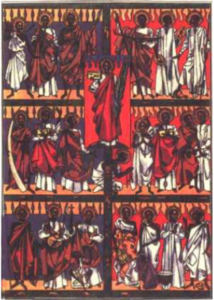
It was the faith of missionaries who travelled through Africa that influenced communities enough for them to convert to Christianity. Leaving ancient customs and rituals is rarely without cost or loss of influence. The account of the martyrs of Uganda speaks of great bravery and real commitment to the Gospel. the account reminds me of the three men thrown into the fire furnace as told in the Book of Daniel 3: 8-25. If you have time, see a video from the Ugandan Tourist Board here .
Just as Glendalough became a great centre of pilgrimage after the monastery was founded by St. Kevin, so people throughout the world find places to gather and to encounter God. It is such a shame that Lourdes, Guadaloupe, Walsingham and Fatima will be quieter this year. No doubt next year they will be busy again.
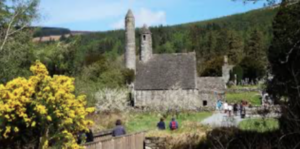 The the letter of Saint Paul to Timothy is written by a man under arrest.
The the letter of Saint Paul to Timothy is written by a man under arrest.
In the longer text you can find in the Universalis, we discover who influenced Timothy. Paul writes:
‘I am reminded of the sincere faith which you have; it came first to live in your grandmother Lois, and your mother Eunice, and I have no doubt that it is the same faith in you as well.’
Well done Granny and mum for passing on their Christian faith and helping Timothy come to know Jesus!
Tuesday 2nd June
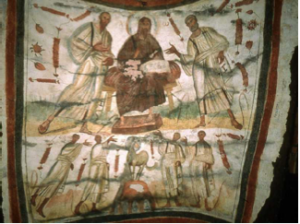 Saints Marcillinus and Peter were early Christian martyrs. Their sacrifice reminds us of the difficulties the first believers made in the early days. In our time, many Christians do suffer persecution around the world. However, perhaps the biggest threat to our faith is that of indifference. Many seem to care little about what we hold to be a precious understanding of our maker. We can only hope to change this by example, like paying our taxes as Jesus reminds us in the Gospel! The first Christians had expected Jesus to return promptly to end the world, do away with injustice, bring the righteous to heaven and their persecutors to a different outcome. As the years passed, some doubted that the End of Days would ever happen. All they saw was opposition to Jesus’ message. The apostles Peter and Paul sought to reassure the new converts. In his leAer, Saint Peter urges his readers to live spotless and saintly lives and use each moment to ensure that they would be amongst those who were saved when the chips were down.
Saints Marcillinus and Peter were early Christian martyrs. Their sacrifice reminds us of the difficulties the first believers made in the early days. In our time, many Christians do suffer persecution around the world. However, perhaps the biggest threat to our faith is that of indifference. Many seem to care little about what we hold to be a precious understanding of our maker. We can only hope to change this by example, like paying our taxes as Jesus reminds us in the Gospel! The first Christians had expected Jesus to return promptly to end the world, do away with injustice, bring the righteous to heaven and their persecutors to a different outcome. As the years passed, some doubted that the End of Days would ever happen. All they saw was opposition to Jesus’ message. The apostles Peter and Paul sought to reassure the new converts. In his leAer, Saint Peter urges his readers to live spotless and saintly lives and use each moment to ensure that they would be amongst those who were saved when the chips were down.
As we look to Scripture for inspiration today, we have a different perspective given by centuries of Christian thought and prayer. When we pray for those recently deceased, our hope is that they do not have to wait for any future Day of Judgement but are immediately gathered into the Kingdom of God. Their Final Day is personal, so to speak. For those drawing near to heaven and fading from this life today, we support them with our prayers for their journey.
Monday 1st June 2020
Mary, Mother of the Church
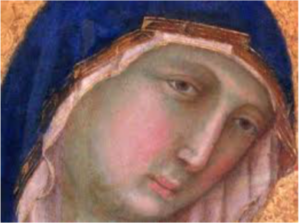
By virtue of giving birth to Jesus, Mary enjoys the title of Mother of the Church. Pope Paul VI solemnly confirmed the title in an address to the Fathers of the Second Vatican Council on 21 November 1964 and decreed that the whole Christian people should, by the use of this beautiful title, give still greater honour to the Mother of God. As we begin another month of this extraordinary year, we pray with Mary for the protection of our families & friends.
From our rooms & houses, let us pray for each other & our world, male or female, black or white, rich or poor. Sometimes it is the Psalm that can help us through the day. The people who sang these words so long ago are our companions in faith through the ages. They share our deep conviction that the Most High creator could be near them like a parent might care for their own son or daughter. Let us pray for all those who feel vulnerable today, or that their lives are not so important: Everyone’s life matters.
He who dwells in the shelter of the Most High
And abides in the shade of the Almighty
Says to the Lord:
‘My refuge, my stronghold,
My God in whom I trust!’
Sunday 31st May
Feast of Pentecost
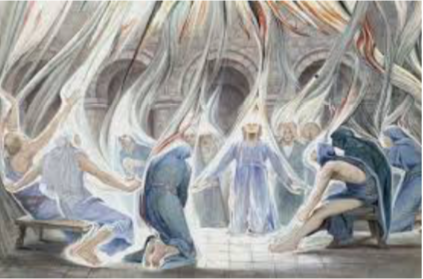
Today we feel the wind beneath our wings
Today the hidden fountain flows and plays
Today the church draws breath at last and sings
As every flame becomes a Tongue of praise.
This is the feast of fire, air, and water
Poured out and breathed and kindled into earth.
The earth herself awakens to her maker
And is translated out of death to birth.
The right words come today in their right order
And every word spells freedom and release
Today the gospel crosses every border
All tongues are loosened by the Prince of Peace
Today the lost are found in His translation.
Whose mother-tongue is Love, in every nation.
Malcolm Guite
Reflection: HAPPY FEASTDAY
Today, like the first Christians, we are invited to thank God for the Gift of the Holy Spirit. For those huddled up in fear, hiding in the Upper Room, the Holy Spirit appeared like tongues of flame. We may not encounter our Lord in the same way. However, we pray for the confidence to live out our faith in the understanding that we are deeply loved by God.
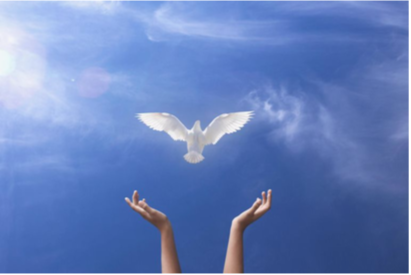
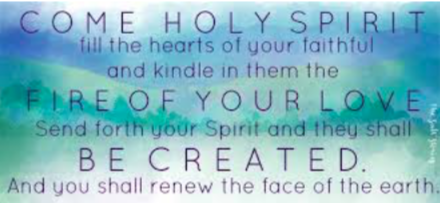
Saturday 30th May – Seventh Saturday in Eastertide
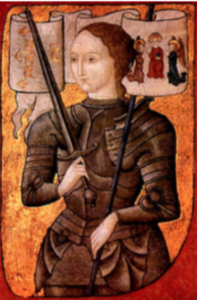
Todays’ Gospel concludes John’s account of the presence of Jesus with those he called to accompany him. The Gospel is as much a spiritual journey as a record of events. We read the thoughts of those still at the beginnings of Christianity. They hold an expectation that the Second Coming is imminent. That the Lord would save believers from persecution by calling time on time, heralding a new heaven & a new earth (Book of Revelation of St. John Chapter 21).
Nearly two thousand years later we have a different perspective. Whilst we pray for the coming of Gods Kingdom every time we say the Our Father, we combine that phrase with ‘Your will (is being) done on earth as it is in heaven’. We imagine the City of God being built with our faith and action here & now. To give us the strength to build the Kingdom we ask, ‘Give us this day our daily bread’. Our prayers help us focus on the essential & also to look beyond our personal situation. In writing about how we all recover from the effects of Coronavirus Pope Francis urges us in the Church to look beyond our own needs & look to the needs of those around us too. To ‘break the mirrors in our houses’ that can make us concentrate only on ourselves so we can show love for our neighbour.
The examples of Saint Paul should help us. He used two years of house arrest in Rome to preach about Jesus & bring people closer to God. Whatever our circumstances, we can help build a better place to be.
Friday 29th May – Seventh Friday in Eastertide
In our first reading from Acts of the Apostles we get official confirmation that Saint Paul will go to Rome for his case to be heard by Caesar. This is better covered in the longer version of the text in Universalis, available from the website olaspandstjosephs.org.uk
By virtue of his status as a Roman Citizen, Paul can present the Gospel of Christ to the widest audience. His testimony helps lay the foundations for the whole of the Roman Empire to adopt our faith under the instruction of Constantine, a later Emperor of Rome.
When a Pope is elected it is common for them to change names. As he is no longer speaking for himself but for the whole Church, the new Holy Father may assume the name of a previous figure that had something to say in his time but with a message still relevant today. When Giovanni Montini was elected Pope, he changed his name to Paul, the great evangeliser.
The following biography is from Universalis. It is worth reading especially as Paul VI is a saint who lived during the lives of many of us. Incidentally, he was a favourite of my mum. The Gospel reflection follows.
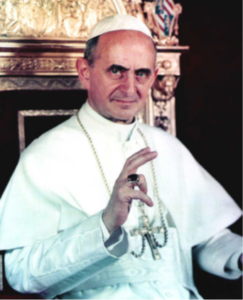 Pope St Paul VI (1897-1978)
Pope St Paul VI (1897-1978)
Giovanni Battista Montini was born on 26 September 1897 in the village of Concesio, in the province of Brescia, Lombardy. He was ordained priest on 29 May 1920 and worked in the Roman Curia, the Vatican civil service, until he was made Archbishop of Milan in 1954. He was elected Pope on 21 June 1963, successfully saw the Vatican Council through to its completion, promoted the renewal of the Church’s life and especially of the liturgy. He also promoted ecumenical dialogue and the proclamation of the Gospel to the
modern world. He died on 6 August 1978.
He was canonized by Pope Francis in 2018.
In a reflection from 5 August 1963, one and a half months after his election to the See of Peter, Paul VI wrote: “I must return to the beginning: relationship with Christ… that must be the source of the most sincere humility: ‘leave me, for I am a sinful man…’; be it in availability: ‘I will make you fishers…’; be it in the symbiosis of will and grace: ‘for me to live is Christ…’”.
Love for Christ and love for his Church. With good reason he could write in Pensiero alla morte: “I pray that the Lord will give me the grace to make of my approaching death a gift of love to the Church. I can say that I have always loved her and I feel that I have lived my life for her and for nothing else”.
When the Holy Spirit chose him as the Successor of Saint Peter, someone already taken by the figure and apostolic activity of Saint Paul, he did not spare his energies in the service of the Gospel of Christ, of the Church and of humanity, seen in the light of the divine plan of salvation. As his teachings show he was a defender of human life, peace and true human progress. He wanted the Church, inspired by the Council and implementing its normative principles, to rediscover ever more her identity, overcoming the divisions of the past and by being ever more attentive to the new age. He wanted the Church of Christ to place the centrality of God and the preaching of the Gospel in the first place, even when she spends herself in the service of the brothers and sisters, in order to build that “civilisation of love” begun by the Holy Spirit at Pentecost.
In Notes for my Last Will and Testament, Paul VI wrote: “No monument for me”. Even if a monument was erected in the Duomo of Milan in October 1989, the true monument to Saint Paul VI is the one built by his witness, his works, his apostolic journeys, his ecumenism, his work on the revised Vulgate, in the Liturgical renewal and his many teachings and examples by which he showed forth the face of Christ, the mission of the Church, the vocation of contemporary humanity and reconciling Christian thought with the requirements of the difficult moment in which he, with much suffering, had to guide the Church.
GOSPEL REFLECTION: We may recall Peter at the Last Supper in the Upper Room pledging unfailing loyalty to Jesus. Jesus grounds his protestations when Our Lord says to him, Before the Cock crows, you will have betrayed me three times. We are all too familiar with the events as they unfolded that night & how Peter’s loyalty was on the slide. We are told that Peter wept bitterly because of his own weakness & the culmination of all the events of that time. He was to carry the guilt of betraying his friend for some time.
Such emotions can destroy or can be transformative. In today’s Gospel we see how Jesus changes all that pain into a point of strength for Saint Peter. At the dawn of a new day, during one of the times that Jesus appears having conquered death, Jesus asks Peter repeatedly if he loves Him. The pain for Peter of being interrogated by his friend must have cut him to the quick. But it was to lance all this pain that Jesus persisted. As it is recorded that Peter denied knowing Jesus three times on the night Our Saviour was taunted, spat at & flogged, Jesus allows Peter to heal the wounds these denials made. They canker is removed & the scars in their relationship can heal.
This incident is recorded by the Gospel writer because of the pain of that night before. As the sun rises by the shores of the lake, Peter is made whole again, absolution given & a Peter sent out anew.
Whilst we may all be able to see ourselves in this Gospel, presenting ourselves before Jesus for the same healing, this reading is especially important with reference to our church leaders. Pope Saint Paul VI would have had any number of opportunities to deny the influence of Jesus in his ministry. Pope Francis is faced with decisions every day that effect how people view the Catholic Church. Let us pray for our present Christian leaders that they have the vision & strength to be good examples in Christian discipleship.
Thursday 28th May – Seventh Thursday in Eastertide
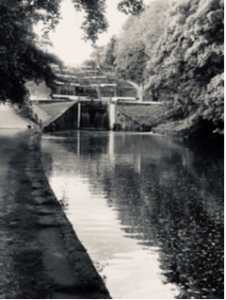
Today we have a revealing conversation between Saint Paul & a local official representing Rome. It is found in the longer version of the First Reading in Universalis. We find that the official had to pay a lot of money to become a Roman citizen. Paul was Roman by birth. For this reason Paul could demand for the case against him to be heard in Rome. He also manages to escape a flogging & being held in chains by virtue of this.
In debate, Paul had pitted the two good Jewish traditions against each other. The Sadducees had no faith in the resurrection whilst the Pharisees were hoping in the life to come. Where does our faith lie?
In the Gospels, Jesus preaching is clear. Eternal life starts with our belief & acceptance of God in our lives. Eternal life does not ‘start’ when we die, but is a present reality but only fully lived when we are invited to join God ‘in my Father’s House’ when we move on from this world. Whilst conducting funerals, I hope to convey this message. As we pray for the deceased person we commend to God, we keep faith in seeing them again & their companionship with us on our journey. We pray for the help of the saints. Surely that includes our loved ones too.
Wednesday 27th May – Seventh Wednesday in Eastertide
Feast of St. Augustine of Canterbury
A few years ago I travelled as a pilgrim with members of my previous parish in Leeds to Kent. We went to see the place where Saint Augustine made landfall having travelled across Europe to bring Christianity to our shores. He may not have been the first but he influenced people in the south & with the help of the local royals, our faith became established.
Augustine was a man of integrity. It was the whole of him that converted the people he encountered. He did not preach hollow words. We could say the same about the seventy-two who were sent out in thirty-six pairs by Jesus to prepare the way. If they had just shouted at the villagers, they & their story would have easily been dismissed. They preached from the heart. We are invited to do the same & be evangelists for our time.
Seventh Tuesday in Eastertide
Feast of St. Philip Neri, Founder of the Oratorians.
In our readings today we find two people who know that their present life is limited. Jesus is preparing those in the Upper Room for the events that will start to take place as soon as they leave their sanctuary. Paul is talking in similar terms to those around him as he prepares his long journey to Rome for his trial & martyrdom. Neither relishes the thought of being put to death. However, they do not put themselves first – not even at the risk of loosing their own lives.
If either Jesus or Paul had believed that this life is the only one that there is, their preaching, life styles & ultimate self-sacrifice would make no sense.
Jesus constantly refers to his union with the Father, acknowledging God to be the first & last of all things. In John’s Gospel & in religious art this is so often expressed as the alpha & omega the first & last letters of the alphabet in Greek. Paul had a strong belief in the Resurrection & the life to come.
In today’s Gospel passage, we can see that Jesus is thinking beyond the events that will take place in Jerusalem & puts them in a far greater scheme. He refers to the attitudes & lifestyles of people who belong to the world as only a part of a much bigger scene. It is with this conviction – that something far greater is at stake – that he could endure the humiliation of the trials, rejection of the crowd & death on the Cross. He transforms a symbol of torture & disgrace into a badge of honour for Christians throughout time.
Paul is a follower of Jesus & models his life on that of his Saviour. Paul’s conversion changed him through & through & he used his amazing energy to promote the Gospel all around the eastern end of the Mediterranean Sea. When he had run our of wriggle room, he played his final card. As a Roman citizen, he could demand that the case of his accusers could be heard in Rome. During the journey to Rome he writes letters to churches he has visited. They contain teaching, pleas for a bit more order amongst the Christians & testaments to his own faith in Jesus to encourage his fellow converts. He transforms what to many may seem a personal disaster into a touring pulpit.
The Passion of Jesus & the witness of Saint Paul have inspired people throughout the Christian era. Our Saint today is Philip Neri. Universalis contains a painting & profile of the man. After looking at the Readings at Mass, it is well worth taking a look at the About Today section & discovering more about this fellow follower of Jesus.
Seventh Monday of Eastertide
The readings of this week will prepare us for the Feast of Pentecost which marks the end of the most important season of the church year: Easter.
The fifty days we spend celebrating the resurrection of Jesus is regarded as a perfect time, full of new life. In the northern hemisphere it always coincides with spring when out from the cold ground green shoots thrust into the lengthening days & increasing sunlight.
The ancients pondered how the world came to be. Their wisdom is recorded in the Book of Genesis or ‘Beginnings’. They understood that Life & Landscape take time to develop so the Lord God must have made the earth in stages over a series of ‘days’. At the end of each day God delighted in the order formed from chaos. Light emerges from dark, dry land from the waters & life emerges in astonishing variety. By the hand & breath of God, the human form stood up out from the clay, blessed & made holy. We are told God rested on the seventh day.
Easter is arranged in multiples of seven, a perfect number, a prime number. We celebrate the resurrection for seven weeks of seven days. On the Sunday, the fiftieth day since the rising from the tomb we celebrate the gift of the Holy Spirit at Pentecost. We are told at the start of the Bible that the Spirit of God hovered over the waters when everything was in chaos. We invite the Holy Spirit to bring order & energy to our lives.
Some people see the ancient accounts of creation as in conflict with modern scientific knowledge. To me they tackle the same issues from different points of view. The people pondering & praying in the desert so many thousand years ago did not have the wonderful instruments we have today for measuring & quantifying. However, they knew their land, they had a bit of maths & allowed themselves the luxury to wonder how they & their world was made. They sang & rejoiced, privileged to be alive & loved by God.
Seventh Sunday of Eastertide
Most people all over the world believe in God, the maker of all things as the Creed says. The difference we have with many of them is that we believe in a God who is personal to us – one who loves us as individual personalities as well as a part of the whole of Creation. We have faith in a God whom we can rely on & get to know a little in this life on earth. A God who values our existence so much that we are promised life to the full in paradise after our time here.
In our Gospel today, Jesus talks about the most essential:
And eternal life is this: to know you,
the only true God, &
Jesus Christ whom you have sent.
In one of the books on prayer I read years ago, the author says that everything we are is rooted in our maker. He writes, ‘God is the deepest ground of our being’.
All the journeys & efforts of the Gospel writers & first preachers were spurred on by this same faith in a loving God who wants us to live lives to the full – even in lockdown!
Next weekend we celebrate Pentecost. It will be fifty days since Easter and we focus on the gifts of the Holy Spirit. God does not impose on us. We do not have to accept the message of the Gospel. However, as we do, this week we celebrate the love that challenges us to care for others as well as ourselves. We find in our neighbours that same energy & spirit of God at the heart of who we are.
Sixth Saturday of Eastertide
We celebrated the Feast of the Ascension only a couple of days ago. I would like to share with you a poem I received that day from one of the parishioners. It is a sonnet by priest & poet Malcolm Guite written for the feast.
It is blustery today, plenty of energy in the weather. I hope that you all enjoy the weekend.
We saw his light break through the cloud of glory
Whilst we were rooted still in time and place
As earth became a part of Heaven’s story
And heaven opened to his human face.
We saw him go and yet we were not parted
He took us with him to the heart of things
The heart that broke for all the broken-hearted
Is whole and Heaven-centred now, and sings,
Sings in the strength that rises out of weakness,
Sings through the clouds that veil him from our sight,
Whilst we our selves become his clouds of witness
And sing the waning darkness into light,
His light in us, and ours in him concealed,
Which all creation waits to see revealed.
Sixth Friday of Eastertide
In our First Reading we continue to follow the progress of Saint Paul. He uses every opportunity to speak about his new faith in Jesus. Some audiences receive the message well whilst others find it too much. He is supported by a small team of women and men & perhaps by his own labour. In the longer version of today’s reading, found by scrolling down in the readings section of Universalis, we discover that Paul is a tent maker. As a small businessman he would have had to sell his products. It seems that he now uses his gift of the gab to convert people to Christ.
Paul’s journeys are not faint hearted as he travelled down poor roads to the ports & then on little boats to face long trips on a turbulent sea.
Our Gospel continues the preparation Jesus gave his closest friends in the time leading to the Passion. He knows the hour has arrived for him but seeks to reassure the others. For a short time things will turn on their head & they will be saddened by events others will rejoice in. However, his ultimate message is that ‘All Will Be Well’ after this time of trial.
The Feast of the Ascension – Thursday 21st May
Today we focus on the conclusion of the occasions when Jesus was present to the Apostles after the Resurrection. We are told he is taken up to heaven, & the friends of Jesus are told not to be afriad. If Pentecost is described as the birthday of the church, this is the preparation for that great day.
Through the times that Jesus met, ate & drank with his companions after they had witnessed his crucifixion & death on the cross, he revealed our potential for a continued life of blessing. That the death that every human experiences at the end of our days on the earth is not necessarily the end of our existence, but rather a stage on the way.
After the Ascension, the first companions of Jesus found themselves with only their own resources to fall back on. They could not have hoped to enthuse others, preach openly, heal, travel & speak plainly to those in authority so coherently without the outpouring of that gift which Jesus had promised them – the Advocate, the Holy Spirit.
We are reminded that we are made in the image & likeness of God. As such, we are capable of a great deal. By acknowledging the presence of God within us we can do so much more. Happy Feast Day everyone.
Sixth Wednesday of Eastertide
For this sixth Tuesday of Eastertide
Please find below links to other daily reflections by Fr. Jonathan
